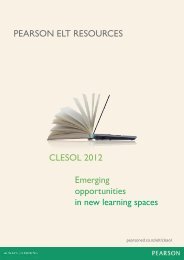Module 1: C'est perso (Pupil Book pp. 6–25) - Pearson
Module 1: C'est perso (Pupil Book pp. 6–25) - Pearson
Module 1: C'est perso (Pupil Book pp. 6–25) - Pearson
Create successful ePaper yourself
Turn your PDF publications into a flip-book with our unique Google optimized e-Paper software.
pers rs<br />
r o 1 Title<br />
1<br />
<strong>perso</strong><br />
<strong>perso</strong><br />
(Page Nos)<br />
1 Title C’est<br />
C’est<br />
Learning objectives<br />
• Describing yourself<br />
• Understanding adjective<br />
agreement (singular)<br />
Framework objectives<br />
4.2/Y7 Language – highfrequency<br />
words: ex. 2<br />
4.5/Y7 Language – (a) present<br />
tense verbs: ex. 3<br />
(Page Nos)<br />
(<strong>Pupil</strong> <strong>Book</strong> <strong>pp</strong>. 12–13)<br />
3 Comment je me vois<br />
Grammar<br />
• adjective agreement (singular)<br />
• être (present singular)<br />
Accès<br />
Studio<br />
Key language<br />
Je suis/Je ne suis pas …<br />
Tu es …<br />
Il/Elle est …<br />
branché(e)<br />
charmant(e)<br />
curieux/curieuse<br />
drôle<br />
généreux/généreuse<br />
gentil(le)<br />
intelligent(e)<br />
modeste<br />
poli(e)<br />
Tu es d’accord?<br />
Je suis d’accord.<br />
Je ne suis pas d’accord.<br />
Accès Studio Unit 7 (<strong>pp</strong>. 16–17) can be used<br />
with this unit for further practice of adjective<br />
agreement and position (and to review colour<br />
vocabulary).<br />
Accès Studio Unit 12 (<strong>pp</strong>. 26–27) can be used for<br />
further practice of être.<br />
Starter 1<br />
Aim<br />
To review avoir and introduce/review the<br />
present singular of être; To use reading<br />
strategies<br />
Write up the following. Give pupils three<br />
minutes to complete the table, using the<br />
sentences to work out the verb forms.<br />
J’ai des clés. Elle a un portable.<br />
Tu es charmant. Je suis intelligente.<br />
Tu as un bâton de colle. Il est modeste.<br />
avoir être<br />
I<br />
you<br />
he/she a<br />
Check answers and ask pupils to translate the<br />
sentences into English.<br />
24<br />
PLTS<br />
R Refl ective learners<br />
Cross-curricular<br />
ICT: emailing<br />
Resources<br />
CD 1, tracks 6–7<br />
Accès Studio pages 16–17 &<br />
26–27<br />
Cahier d’exercices A & B, page 4<br />
ActiveTeach:<br />
p.012 Grammar skills<br />
p.013 Grammar<br />
p.013 Grammar practice<br />
1 Écoute. Qui est-ce? (1–9) (AT 1.1)<br />
Listening. <strong>Pupil</strong>s listen to nine people describing<br />
themselves and identify the speaker each time.<br />
Audioscript CD 1 track 6<br />
1 Je suis charmant.<br />
2 Je suis branché.<br />
3 Je suis curieuse.<br />
4 Je suis intelligente.<br />
5 Je suis polie.<br />
6 Je suis drôle.<br />
7 Je suis gentil.<br />
8 Je suis généreuse.<br />
9 Je suis modeste.<br />
Answers<br />
1 Yanis 2 Frank 3 Ophélie 4 Malika 5 Samira<br />
6 Nicolas 7 Valentin 8 Luna 9 Nassim<br />
Studio Grammaire: adjective<br />
agreement (singular)<br />
Use the Studio Grammaire box to review the<br />
changes to adjectives in the feminine form.<br />
There is more information and further practice<br />
on <strong>Pupil</strong> <strong>Book</strong> p. 23.<br />
<strong>Pupil</strong>s follow the adjective patterns to work<br />
out the feminine forms of the following<br />
adjectives: petit (small), paresseux (lazy), impoli<br />
(rude), heureux (ha<strong>pp</strong>y), grand (big), facile (easy).



